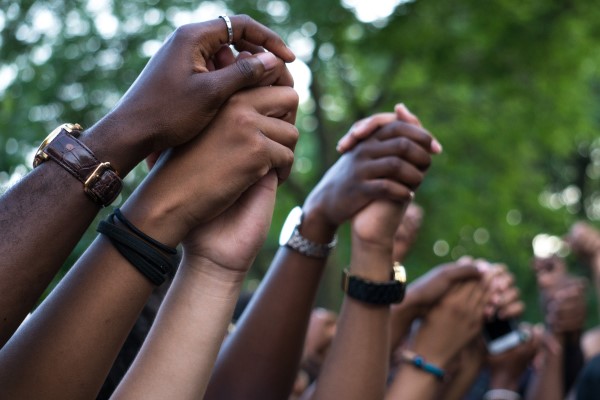Do you want to see change in schools and wider society in terms of challenging racist structures? Nicola Harvey shares three areas for action.

Many of us are using lockdown to reflect on our personal values and take a meaningful look at the structure of the society we live in.
Sparked by the treatment and injustice towards George Floyd, Breonna Taylor and many other black people in the UK, US and across the world, this is a time when people are saying enough is enough and are campaigning for much needed change.
With a collective message that Black Lives Matter the recent uprising of civil protests for racial equality does not exclude other races, but highlights the disproportionate socio-economic inequalities and unconscious bias towards black people.
It is everyone’s responsibility, particularly decision makers in schools, to come together and stand for equality, diversity and inclusion
So, what does this mean for schools in the UK? Research from the race equality think tank Runnymede found a chronic under-representation of BAME teachers in the UK. A third of BAME workers witnessed or experienced racial abuse in the seven months following the Brexit vote and the government's Timpson review into school exclusions in 2019 revealed that black Caribbean pupils are round 1.7 times more likely to be permanently excluded compared to white British children.
Now more than ever, school leaders are being called to not only promote diversity and inclusion, but to take affirmative action.
Here are some practical ways to create positive change.
1. Be visible and show support
-
Have open discussions and ask for feedback from BAME colleagues, students and parents to understand their experiences – even if it feels uncomfortable. Just listening with a sense of compassion is the first step to change.
-
Be open to creating better systems for transparency and equality in your school community.
-
Familarise staff with the Anti-Racism Resource List – curated by diversity and inclusion leader Dr Tiffany Bowden. Use the subject areas in the reports to educate senior leaders, school staff and students on appropriate subjects covered within the reports.
-
To help parents talk about racial equality, share the Parents Guide to Black Lives Matter which has a range of age-related resources, activities and tips.
-
Start a committee to review policies, staff meeting subjects and school events ensuring BAME staff, parents and students feel included and are represented.
-
In consultation with BAME colleagues and the PTA, write to your school community sharing the commitment to promoting diversity. See this example from Cotham School in Bristol, written in light of recent events.
-
Ensure students and staff mental health is treated as a priority by getting in touch with organisations like ChildLine, Place2Be, The Black, African and Asian Therapy Network and the BiPP Psychiatry & Psychology Network for guidance during this unprecedented time.
2. Decolonise the curriculum
-
In response to the Black Lives Matter movement Twinkl Education have created additional resources focussed on diversity, inclusion and equality to help teachers combat racism and give children a sense of belonging.
-
Using the growth mindset model talk openly to students about the language surrounding racism, privilege and prejudice. And if this is not appropriate, due to their age or learning abilities, share the importance of being kind, treating others fairly and why we should celebrate our differences.
-
Over 300,000 people have signed Joshua Bailey’s petition urging the UK government to teach school children about British imperialism and colonialism. Show your support by signing the petition and using resources from The Black Curriculum – a social enterprise campaigning for black history to be taught in schools all year round.
-
Ensure the school library is stocked with books showing ethnically diverse content from BAME authors. See these suggestions from #BAMEEd.
-
Create a curriculum map with positive and successful BAME inventors and role models to inspire students in their learning all year round.
Here are some examples.
-
In science, students could learn about Charles Drew, the African American man who created the first large-scale blood bank in the 1900s, an invention still being used in hospitals today.
-
In English, write about Gandhi and his aim to lead India peacefully in a non-violent movement against British rule.
-
In business studies, students may be inspired by Madam C. J. Walker – one of the first female black self-made millionaires.
-
In PE, students could play STOP, PAUSE and GO movement games to learn about Garrett Morgan, the black man who invented the traffic light system.
-
In media studies, students could explore expressive arts by reviewing work from Dapo Adeola, Ballet Black, Cocoa Girl Magazine and many others!
3. Representation matters
-
Educate staff on why representation is important across the school community. Share this TedEx video from senior educator Aisha Thomas on Why Representation Really Matters.
-
Make every effort to employ a diverse range of teachers, governors and leadership teams through blind recruitment or purposefully targeting teachers from BAME backgrounds.
-
When organising INSET days, look for BAME speakers to train staff in a range of subjects.
-
Encourage staff to connect with organisations like #BAMEEd, #DiverseEd, Runnymede and Voice4Change to network with like-minded peers, share best practice and find a sense of community.
-
Discuss and show students videos of high-profile positive role models sharing their experiences of discrimination and how they used this as fuel to strive towards a better future.
Getting started
The list above may seem extensive, but this is just the tip of the iceberg. The cultural, systemic and unconscious biases need to change. To get started, you may want to choose two or three activities from above, create a plan of action and then build upon this over time.
Either way, it is everyone’s responsibility, particularly decision makers in schools, to come together and stand for equality, diversity and inclusion.
Do something today to make a difference.
